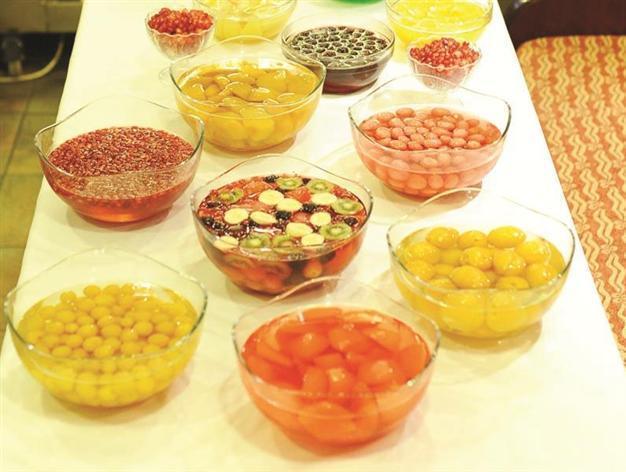Ottomans’ drink sherbet relegated to Ramadan
ISTANBUL - Anatolia News Agency

The restaurant prepares some 100 types
of traditional Ottoman sherbet and offers 15-20 types a day to its customers. AA photos
Sherbet, once the most popular Ottoman
drink, has been essentially relegated to symbolic consumption during the holy month of Ramadan even though it is a healthier alternative to today’s soft drinks, according to one restaurant proprietor.
“People of all ages are drinking soft drinks which are very harmful. We are trying to keep the sherbet tradition alive in our restaurant,” Abdullah Korun, general director of Istanbul’s 123-year-old restaurant Hacı Abdullah Lokantası, recently old Anatolia news agency. “We prepare nearly 100 types of sherbet but we serve 15 to 20 types a day to our customers. Restaurants should keep such natural drinks rather than soda drinks.”
During the time of the
Ottomans, there were roughly 300 types of sherbets made from various fresh flowers and fruits such as rose, lily, jasmine, silverberry, lotus, violet and others. Today, this traditional drink is still kept alive in modern life but with fewer types. Korun said sherbet was one of the most important products both in the kitchen of the palace and the public in the past.
The director of the restaurant, which was opened during the era of Abdülhamit II, said sherbet, made from dried and cold stewed fruits, was a favorite and irreplaceable drink, particularly during the holy month of Ramadan. “In the past, there were no refrigeration systems like fridges and sherbet was prepared and consumed daily,” he added.
Forgotten through timeKorun said the Ottomans’ sherbet began to be forgotten through time. “Almost all housewives in Ottoman times used to prepare canned foods, pickles and sherbet in their house, but today, since women are involved in social and business life, this tradition is disappearing,” he said.
He said it was consumed both in winter and summer during Ottoman times since it had a significant place in social life. “People used to benefit from natural methods to avoid diseases in the past. But in Ottoman times, people used to drink sherbet to protect themselves from diseases. Of course, the medicine sector was not developed that much and there were not too many types of diseases. This is why sherbet was the most important medicine,” Korun said.
Cranberry, quince, black mulberry and wild strawberry sherbets are particularly good for tonsil problems and cold, he said.
Turkey, eat,
